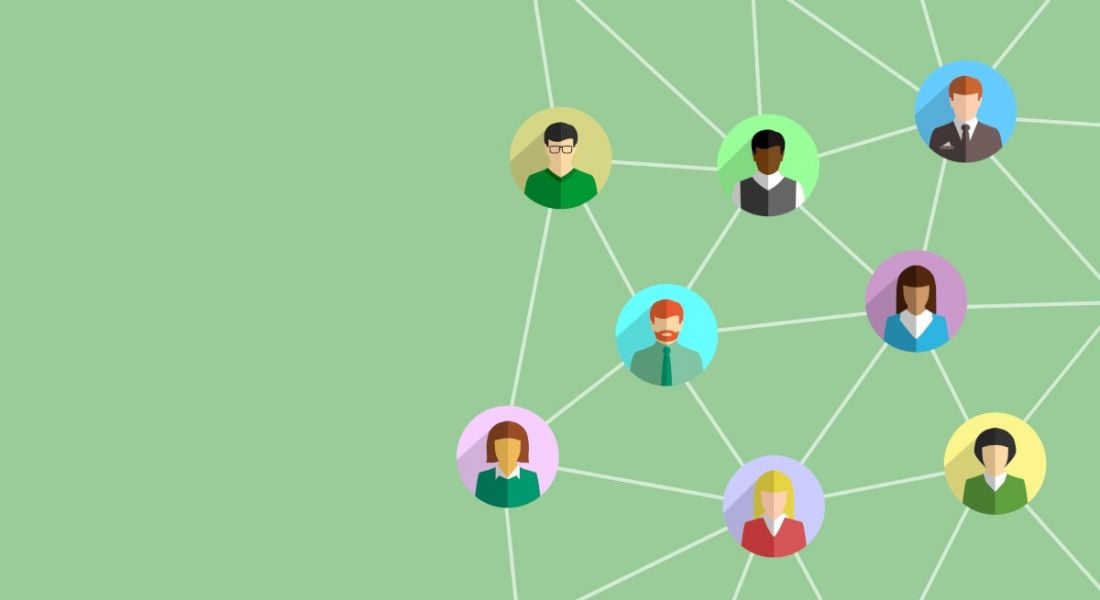Networking is incredibly important in today’s working world, even at the early stages of your career. Here are some tips to help you get started.
You’ve probably heard by now that networking is a crucial part of working life. But when you’re at the start of your career, it can be hard to strike up conversations or even identify the people you should be having them with.
To help you start building a solid network at the early stages of your professional life, here are some tips from people in the Silicon Republic community.
Remember that networking should be mutually beneficial
While networking can be a challenge for everyone, Iana Boghiu, IT business analyst VP at Citi, said it can be particularly daunting for introverts. In her own career, she has found that being true to herself and slowly moving beyond her comfort zone have helped.
“Some companies have formal networking. I joined Citi’s Women in Tech and wider Women’s Network groups to get to know people in Dublin as my team is global,” she said. “It’s up to you to find what’s right for you, be it attending physical events or writing articles and blogs on a topic that interests you.
“Then build on that by slowly getting yourself outside your comfort zone to expand your skills and network, because it comes down to allowing people in your wider circle to know you and your skills.
“Look at themes that you are interested in because you want to be true to yourself. Long-lasting relationships will work only when there are genuine and mutual interests and trust. In the end, it’s about having people around you that will celebrate your success, push you during hard times or direct you when you are lost or looking for new areas.”
Niamh McInerney, head of graduate recruitment at PwC Ireland, echoed Boghiu’s point about the importance of networking being mutually beneficial.
“At its core, effective networking at any stage is based on the exchange of mutually beneficial information,” McInerney said. “Whether online or face to face, I would say the tips for effective networking are the same.
“For me, these include identifying who you want to connect with, being clear on what you are looking for, doing your research, deciding specifically what you would like them to know, and listening. Don’t be afraid to give something back and do the follow-up afterwards. Connect with them on social media.”
Get involved with diverse groups
Triona Geraghty, deputy HR director at Aon, and Cat McGurren, EMEA recruiter at Patreon, both suggested getting involved with different groups – both within and beyond a company.
“Invest time and show an interest in connecting with others,” Geraghty advised. “One way of networking outside of your immediate team members is to volunteer to join various business resource groups or social committees.
“A certain amount of networking will naturally occur in the day-to-day of completing tasks and other role responsibilities. One tip to go above and beyond this is to add networking as one of your goals – task yourself to connect with two new colleagues per month, for example. You never know how and when a particular relationship will smooth a future path!”
‘Networking is one of the most powerful skills you can have in your career and is a skill that can be learned’
– MARIE RYAN, FIDELITY INVESTMENTS
McGurren believes it’s worthwhile looking into technology clubs and societies when you’re still at college. “Many of these have a Discord community to chat about graduate roles, and all of them invite companies to come and talk to them. It’s a great way to meet future employers.”
She added that it’s OK to reach out and ask when a company’s intern or graduate programme opens for applications, and also recommended engaging with tools and technologies that reflect the industry you want to get into. “Our vacancies are mainly in product and technology, so it’s important for us to see that candidates have a genuine passion for their industry. We like to see evidence of a GitHub account or personal coding projects.”
Present your work
Gordon Morrow, a senior software engineer at Verizon Media, said that the easiest and most effective way to network early in your career is to “present initiatives and solutions” worked on by your team to a wider audience.
“This worked for me personally by presenting at a large internal conference in Sunnyvale, California,” he said.
“As a result of this, I interacted with a lot of people in the wider company and made many connections, which proved invaluable when working on new tech stacks or design work as I had a network now to reach out to. Tools like LinkedIn meant that I could connect and share experiences both from my own work and also what the industry trends were.”
Make your networking ‘diagonal’
According to Marie Ryan, senior corporate actions manager and scrum master at Fidelity Investments, getting to know more people will help open doors in your career and expose you to “sounder advice in making the important decisions that shape your life”.
“Networking is one of the most powerful skills you can have in your career and is a skill that can be learned,” she said.
Ryan’s tips included being your authentic self, setting out two or three specific questions to ask a new connection before meeting them, being clear about your goals, making sure to follow up after your initial meeting and being intentional about who you want to connect with and why.
“Networking is not always about looking for upwards leaders; ensure to network diagonally and use other resources such as groups, affiliations and team initiatives to get involved.”
Say yes
Conor Davin, a quality control analyst in MSD Dunboyne’s microbiology lab, said that “putting yourself out there” is an important part of building a network. This is what helped him take on the role of biosafety officer alongside his main job, giving him opportunities to present to more senior colleagues.
“I’ve had the chance to take on new responsibilities, acquire additional training and get more involved in different tasks,” Davin said. “I would strongly recommend taking opportunities when they’re offered.
“While you might feel like you’re too busy or don’t have time, you should take those opportunities when they arise, because otherwise you’ll never get a chance to see what you like or meet new people. It all comes down to putting your hand up, saying yes, and getting involved.”
Don’t be put off if you’ve changed career
Networking can be just as daunting if you’ve decided to make a career change later in life. Dun & Bradstreet software engineer Stuart Grimes, for example, completed a diploma in computer science after working as a chartered accounted for almost 20 years.
“Looking back on those first few months, I would recommend that you take the time to establish a network of knowledge for yourself,” he said.
“There are many technologies we all use in our day-to-day work. Try and understand the constituent parts of your role, identify the people who have the most knowledge about that topic, and approach them. Ask if it’s OK to reach out to them with questions or, better still, try to schedule a regular time with them where you have a chance to build up a bank of questions.
“This is a great way to build your knowledge and your network, and really helps establish a great working relationship with your new colleagues.”
Make the most of online networking tools
Avanade’s early careers lead for Ireland and the UK, Isabelle Fernandes, reminded us of the importance of online tools for networking in the era of remote working.
“LinkedIn is your friend,” she said. “Tell people why you’re interested in them and suggest a virtual coffee; a 15-minute Teams chat translates across continents, professions and generations. So long as you match up the time zone, you are more empowered than ever to learn from others and meet new people and opportunities.
Fernandes also said that LinkedIn’s Recommendations feature can be a great addition to your networking toolkit. “Remember, no one is totally out of reach.”




